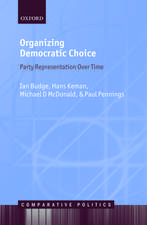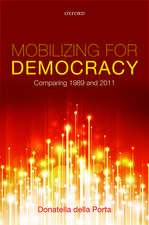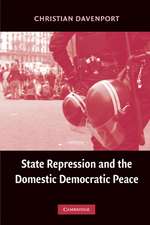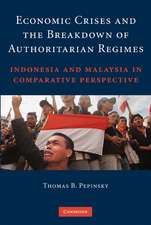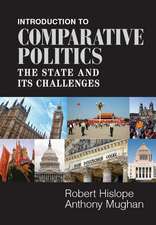Political Institutions and Party-Directed Corruption in South America: Stealing for the Team: Political Economy of Institutions and Decisions
Autor Daniel W. Gingerichen Limba Engleză Paperback – 27 apr 2016
| Toate formatele și edițiile | Preț | Express |
|---|---|---|
| Paperback (1) | 287.66 lei 6-8 săpt. | |
| Cambridge University Press – 27 apr 2016 | 287.66 lei 6-8 săpt. | |
| Hardback (1) | 694.23 lei 6-8 săpt. | |
| Cambridge University Press – dec 2013 | 694.23 lei 6-8 săpt. |
Din seria Political Economy of Institutions and Decisions
-
 Preț: 235.99 lei
Preț: 235.99 lei -
 Preț: 231.82 lei
Preț: 231.82 lei -
 Preț: 177.53 lei
Preț: 177.53 lei -
 Preț: 211.85 lei
Preț: 211.85 lei -
 Preț: 200.87 lei
Preț: 200.87 lei -
 Preț: 306.68 lei
Preț: 306.68 lei -
 Preț: 208.16 lei
Preț: 208.16 lei -
 Preț: 133.60 lei
Preț: 133.60 lei -
 Preț: 295.55 lei
Preț: 295.55 lei -
 Preț: 236.43 lei
Preț: 236.43 lei -
 Preț: 228.38 lei
Preț: 228.38 lei -
 Preț: 265.11 lei
Preț: 265.11 lei -
 Preț: 281.49 lei
Preț: 281.49 lei -
 Preț: 285.37 lei
Preț: 285.37 lei -
 Preț: 279.98 lei
Preț: 279.98 lei - 14%
 Preț: 773.75 lei
Preț: 773.75 lei -
 Preț: 233.38 lei
Preț: 233.38 lei -
 Preț: 247.41 lei
Preț: 247.41 lei -
 Preț: 203.12 lei
Preț: 203.12 lei -
 Preț: 230.33 lei
Preț: 230.33 lei -
 Preț: 286.69 lei
Preț: 286.69 lei - 14%
 Preț: 790.57 lei
Preț: 790.57 lei -
 Preț: 265.32 lei
Preț: 265.32 lei - 11%
 Preț: 554.15 lei
Preț: 554.15 lei -
 Preț: 287.07 lei
Preț: 287.07 lei - 11%
 Preț: 700.20 lei
Preț: 700.20 lei -
 Preț: 273.13 lei
Preț: 273.13 lei -
 Preț: 459.84 lei
Preț: 459.84 lei -
 Preț: 280.35 lei
Preț: 280.35 lei -
 Preț: 260.11 lei
Preț: 260.11 lei - 11%
 Preț: 640.30 lei
Preț: 640.30 lei -
 Preț: 286.89 lei
Preț: 286.89 lei -
 Preț: 247.80 lei
Preț: 247.80 lei - 11%
 Preț: 691.81 lei
Preț: 691.81 lei -
 Preț: 287.48 lei
Preț: 287.48 lei - 11%
 Preț: 641.80 lei
Preț: 641.80 lei - 11%
 Preț: 635.32 lei
Preț: 635.32 lei -
 Preț: 271.01 lei
Preț: 271.01 lei -
 Preț: 265.70 lei
Preț: 265.70 lei -
 Preț: 227.83 lei
Preț: 227.83 lei
Preț: 287.66 lei
Nou
Puncte Express: 431
Preț estimativ în valută:
55.05€ • 57.26$ • 45.45£
55.05€ • 57.26$ • 45.45£
Carte tipărită la comandă
Livrare economică 15-29 aprilie
Preluare comenzi: 021 569.72.76
Specificații
ISBN-13: 9781107656093
ISBN-10: 1107656095
Pagini: 304
Ilustrații: 25 b/w illus. 2 maps 20 tables
Dimensiuni: 152 x 229 x 17 mm
Greutate: 0.45 kg
Editura: Cambridge University Press
Colecția Cambridge University Press
Seria Political Economy of Institutions and Decisions
Locul publicării:New York, United States
ISBN-10: 1107656095
Pagini: 304
Ilustrații: 25 b/w illus. 2 maps 20 tables
Dimensiuni: 152 x 229 x 17 mm
Greutate: 0.45 kg
Editura: Cambridge University Press
Colecția Cambridge University Press
Seria Political Economy of Institutions and Decisions
Locul publicării:New York, United States
Cuprins
1. Institutions and political corruption: a framework; 2. Institutional design and the case for mechanism-based analysis; 3. Ballot structure, political corruption, and the performance of proportional representation; 4. An approach to overcoming the fundamental problem of inference in corruption studies; 5. Political career paths in the bureaucracy and the use of institutional resources in Bolivia, Brazil, and Chile; 6. Conclusion.
Recenzii
'Gingerich's book is a valuable addition to studies on corruption and serves as an excellent example of high-quality institutional analysis. By showing that ballot structure affects corruption, he demonstrates that institutions affect the outcome of interest through different mechanisms. Assessing their overall impact, therefore, requires taking all of them into consideration. Gingerich collected new data for the book and offers what is probably the most sophisticated treatment of corruption I have seen in the comparative literature. The chapter 'Institutional Design and the Case for Mechanism-Based Analysis' is the best exposition I have ever seen of what comparative institutional analysis should be. This is a great book!' José Cheibub, Boeschenstein Professor of Political Economy and Public Policy, University of Illinois, Urbana-Champaign
'Political corruption is the art of stealing the money of citizens to win their vote. Daniel W. Gingerich provides brilliant portraits of how these two activities are connected, writing with both great precision and flair about how bureaucratic recruitment and ballot designs shape the fate of political incumbents. With an impressive design that combines case studies, formal models, and survey data, Gingerich's book is both substantively important and a blueprint of how to conduct research in political science today.' Ernesto Calvo, University of Maryland
'Political corruption is the art of stealing the money of citizens to win their vote. Daniel W. Gingerich provides brilliant portraits of how these two activities are connected, writing with both great precision and flair about how bureaucratic recruitment and ballot designs shape the fate of political incumbents. With an impressive design that combines case studies, formal models, and survey data, Gingerich's book is both substantively important and a blueprint of how to conduct research in political science today.' Ernesto Calvo, University of Maryland
Notă biografică
Descriere
This book examines how the structure of electoral institutions may affect political corruption.



